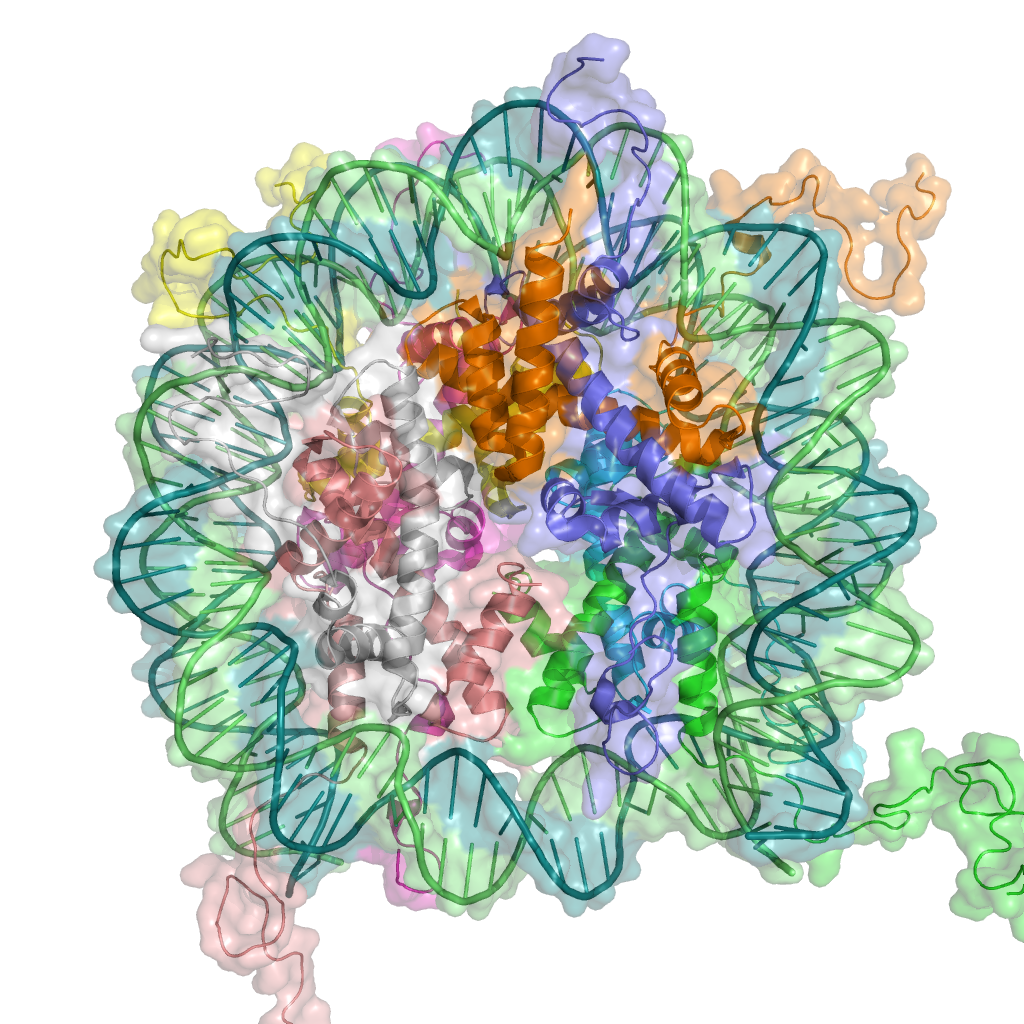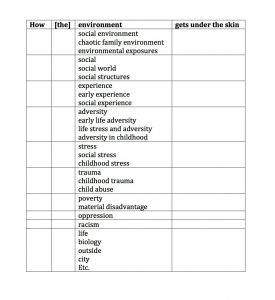
August 15, 2016, by Brigitte Nerlich
When epigenetics gets under the skin
A few days ago, on 12 August, I saw the following conversation on twitter between Martyn Pickersgill and Muireann Quigley. It started with Martyn saying/sighing: “I’m probably going to start crying with frustration if I read the phrase ‘how the environment gets under the skin’ one more time today.” Whereupon Mauireann asked him what he meant. Martyn clarified: “It’s in an obscene number of articles on epigenetics from bioscience, social science and journalists.” Muireann commiserated with Martyn and then said: “Learn something new everyday. Quick google & see this has become a ‘just throw it out there’ catch-all (meaningless?) phrase.”
This exchange made me curious to know when and how this phrase first became prominent in debates about epigenetics, how it developed over time, infiltrated various fields, and why it lost is appeal. Obviously, this is only a quick blog post and I will, as usual, only be able to skim the surface.
The origins
I came across this phrase first in 2012 when it still seemed to have some linguistic power, that is, before its meaning was bleached through overuse, to the point of reducing Martyn almost to tears. I encountered it in a video in which the sociologist Steven Yearley talks about epigenetics which was then becoming a fashionable field in the sociology and philosophy of science. Yearley explains the significance of epigenetics (the study of gene regulation) for advancing social policy. He also stresses that advances in this field might provide new opportunities for collaboration between the social and the biological sciences in order to make better policy. The phrases he used were ‘how biology gets under the skin’ and ‘how the social gets inside into the genome’.
However, this sociologist did not invent the phrase or a variation on the phrase. It first seems to have been used by scientists interested in human development and epigenetics, such as Hyman in 2009 (‘how adversity gets under the skin’), Hertzman and Boyce in 2010 (‘how experience gets under your skin’) and in 2011, by the economist Heckman (how ‘experience gets and stays under your skin’).
Steven E. Hyman is director of the Stanley Center for Psychiatric Research at Broad Institute of MIT and Harvard and Harvard University Distinguished Service Professor of Stem Cell and Regenerative Biology. His 2009 article dealt with how “rat models implicate epigenetic regulation of hippocampal glucocorticoid receptor expression in mediating the effects of early life experience on adult behavior.” The abstract also says that: “A report now suggests that the same mechanism might also be at work in humans.” Clyde Hertzmann (who suddenly died in 2013) was “the Founding Director of the Human Early Learning Partnership (HELP). He was the Canada Research Chair in Population Health and Human Development and Professor in the School of Population and Public Health at UBC.” James Heckman is a Nobel prize winning economist, also interested in human development, especially early childhood development, poverty and inequality. He works at the Centre for the Economics of Human Development at the University of Chicago.
Finally, for 2012 I found an article by Bruce S. McEwen, a neuroendocrinologist, which deals with how the ‘social environment gets under the skin’ in the context of research into the effects of stress on the brain. Both topics, the effects of deprivation on early childhood and the effects of stress on the brain are still very much discussed in the context of epigenetics, social science and in policy circles, separately and together. Since 2012 the phrase has become quite popular in social sciences articles dealing with epigenetics. Why is that?
The metaphor
Hertzmann had used the ‘under the skin’ trope in an article title in 2010. In 2012, in an article on ‘biological embedding’, he also used the phrase and wrote: “Experience, metaphorically, ‘gets under the skin’ in ways that alter human biological and developmental … processes”.
This reminds us that ‘getting under the skin’ is actually a metaphor. ‘To get under somebody’s skin’ can have two meanings, namely: to annoy someone (“It really got under my skin when he said women were bad drivers”), and to affect someone very strongly in a way that is difficult to forget (“Something about the haunting beauty of the place really got under my skin”). In the context of epigenetics, the metaphor is probably used in the second meaning, although, as we have seen the phrase can also lead to annoyance!
Interestingly, this is a metaphor that, like many metaphors for emotion, has a physiological basis. Think about expressions like ‘to be a pain in the neck’, ‘to stick in one’s throat’, ‘to step on somebody’s toes’, ‘to get hot under the collar’, etc. This intimate link between talking, meaning, thinking and physiology makes the ‘getting under the skin’ metaphor quite potent and probably contributed to popularising epigenetics in particular contexts, such as developmental studies, childhood studies, childhood mental health studies, neuroscience and so on.
Sometimes this metaphor is combined with another less physiologically charged metaphor, namely that of cells having a ‘memory’; for example in this sentence from a 2014 article by the philosopher of biology Maurizio Meloni: “how traumatic life experiences become embedded in the ‘memory’ of the organism, getting ‘under the skin’”, referencing the 2009 article by Steven Hyman entitled: “How adversity gets under the skin”.
Some are beginning to take this metaphor ‘literally’, as the following extract from an article on social neuroscience shows: “The ways in which social structures and socio-economic differences literally get under the skin (and in the brain), influencing the human physiology, has always been relevant for sociological theory (Meloni, 2014). In this context, we contemplate epigenetic changes, generated from the social level onto the biological one, as a paradigm of DC [downward causation]. Top-down social processes affecting biology might take place mostly via epigenetic mechanisms.”
The spread
As these examples show, from 2009/2010 onwards the phrase spread widely and invaded sociological and philosophical talk about epigenetics, policy and so on, all the while losing some of its potency through overuse.
To investigate the life and work of the phrase, I turned to Google and searched for ‘gets under the skin’ + epigenetics. This gave me almost 8000 hits. I scanned these hits quite quickly and established the following table of a number of variations of our annoying phrase (‘how the environment gets under the skin’) that are out there. But there are probably many more that one could find. The main topics for which the phrase is used are still related to early childhood studies and the impacts of deprivation, adversity, stress, poverty, trauma and so on. It is mainly in these contexts that ‘the environment’, ‘the social’, ‘experience’, ‘life’, ‘biology’ and even just ‘the outside’ can, it seems, get under your skin in epigenetically mediated ways.
 Overuse and (misplaced?) optimism
Overuse and (misplaced?) optimism
One chapter in a recent book on interdisciplinarity by Felicy Callard and Des Fitzgerald seems to confirm our investigation so far (I only read this chapter after having done my bit of research reported above). It says:
“Many disciplines and epistemological domains now acknowledge that our neurobiology is intimately marked by the social, cultural, and environmental circumstances in which our lives take shape. Indeed, a range of disciplines and approaches … have lately emerged, or redefined their already-existing mission, in order to trace the multiplicity of ways in which, to use the cliché du jour, the social ‘gets under the skin’ (e.g. see Ferraro and Shippee 2009; Hertzman and Boyce 2010; Hyman 2009; McEwen 2012). Research foci range from interests in the role of socio-economic status in childhood neural development (Hertzman and Boyce, 2010), to the way that human social interaction becomes visible in brain function, to the role that the insults of poverty can play in the development of subsequent pathologies (Galea 2011). […] Indeed, it is precisely the growing awareness of the importance of the environment (such is the favoured term) and of (social) experience in understanding both psychopathological and so-called ‘normal’ development that pushes the life and mind sciences to offer hospitality – if not to social scientists themselves, then at least to some of the concepts and phenomena with which they typically ply their trade.”
There is a certain optimism on display here, similar to that expressed in 2012 by Yearley, that social and biological scientists can work together to make the world a better place. This is laudable. I just wonder whether the continued use of the cliché du jour might help or hinder such interactions. Metaphors can be used to create insight and understanding, they can be ‘messengers of meaning‘ between scientific disciplines, but when they are overused and become clichés, they can also cause annoyance – get under your skin….
Image: Nucleosome, by Zephyris at the English language Wikipedia, CC BY-SA 3.0

Hi Brigitte,
It occurred to me that surely some of the metaphor’s popularity owes something to the conception of the skin as a barrier that encompasses the human body and separates it from the external environment? The idea of ‘getting under the skin’ suggests an interaction between all that is external – the environment, society etc – and that which is internal and biological, which is more or less exactly what many of these articles are suggesting epigenetics does.
Given this appositeness , I suspect the titles of epigenetics papers will continue to get under Martyn’s skin for the foreseeable future…
You are right. After posting the post and walking to the uni this same thing actually occurred to me too – I hoped nobody would notice. Yes, there is a certain literalness to this metaphor which means it actually does a good job of linking body and environment. What can be annoying I think is that this is then taken slightly to far and the metaphor becomes hyperbolic in suggesting that we now know what epigenetic mechanisms might mediate poverty or trauma and mental health issues for example – and that we can tweak the whole complex network of issues in social policy etc etc. – I think…..
Yes, I think the problem is that it becomes a black boxed explanation that stands in for any understanding of the complexities of the phenomenon itself, e.g. where we used to say – “what causes disease? Oh its genetic”, we now say “But how do environmental and social factors impact health? Oh that’s epigenetic”. As if that ifs all anyone needs to know.
Incidentally, my initial reply was going to be that maybe Martyn is just being thin-skinned about epigenetics and then I realised that rather than just being a poor pun, it was probably also an example of metaphors of science leading us astray once again. Can we be more or less thin or thick skinned about particular epigenetic exposures..? Is epigenetic risk, like beauty, only skin deep? And so on…
Yes, I think you have hit the nail on the head… to use another cliché… And as for thin/thick skinned etc… I love it when one gets carried away by a metaphor!